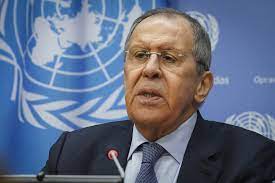United Nations, Apr 26:Russia’s top diplomat warned Tuesday that the European Union “is becoming militarised at a record rate” and aggressive in its goal of containing Russia.
Foreign Minister Sergey Lavrov told a news conference he has no doubts that there is now “very little difference” between the EU and NATO.
Lavrov said they recently signed a declaration, which he said essentially states that the 31-member NATO military alliance will ensure the security of the 27-member EU political and economic organisation.
He was apparently referring to a Jan. 19 EU-NATO declaration on their “strategic partnership” which calls Russia’s Feb. 24, 2022, invasion of Ukraine “the gravest threat to Euro-Atlantic security in decades.”
It calls the present moment “a key juncture for Euro-Atlantic security and stability” and urges closer EU-NATO cooperation to confront evolving security threats, saying this will contribute to strengthening security in Europe and beyond. And it encourages the fullest possible involvement of NATO members that don’t belong to the EU and EU members that aren’t part of NATO, but it does not state that NATO will ensure the security of the EU.
Russian President Vladimir Putin has long complained about NATO’s expansion, especially toward his country, and partly used that as a justification for invading Ukraine.
The Russian attack, however, sent fear through its other neighbors, and Finland joined NATO earlier this month, seeking protection under its security umbrella after decades of neutrality following its defeat by the former Soviet Union in World War II.
While NATO says it poses no threat to Russia, the Nordic country’s accession dealt a major political blow to Putin.
Finland’s membership doubles Russia’s border with NATO, the world’s largest security alliance. Sweden, an EU member, is also seeking NATO membership and is hoping for final approval soon.
NATO chief Jens Stoltenberg defiantly declared last week that Ukraine’s “rightful place” is in the military alliance and pledged more support for the country on his first visit to Kyiv since the invasion. The Kremlin responded by repeating that preventing Ukraine from joining NATO is still a key goal of its invasion, arguing that Kyiv’s membership in the alliance would pose an existential threat to Russia.
Ukraine is also seeking EU membership and in February its leaders pledged they would do all it takes to back Ukraine. But they offered no firm timetable for talks on joining the EU to begin, as Ukraine’s President Volodymyr Zelenskyy had hoped.
Russia’s Lavrov was asked whether the war in Ukraine was a miscalculation since Moscow strongly opposed NATO’s expansion and the invasion sparked Finland’s membership, with Sweden next and Ukraine hoping for a road map to join.
“NATO never had any intention of stopping,” the Russian minister replied, pointing to the recent EU-NATO declaration and actions in recent years that saw non-NATO members Sweden and Finland “increasingly taking part in NATO military exercises and other actions that were meant to synchronise the military programs of NATO members and neutral states.”
Lavrov said Russia was promised on several occasions that NATO would not expand, but said “those were lies.”
“Unbiased assessments that our political scientists as well as those abroad made is that NATO sought to break Russia apart,” he said, “but in the end it only made it stronger, brought it closer together. So, let’s not make any hasty conclusions now as to what this will all end in.” (AP)


